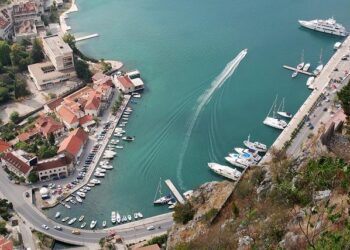Montenegro is enhancing its cybersecurity capabilities in collaboration with allied forces during the Immediate Response 25 exercise, according to recent reports from army.mil. The multinational training event, designed to bolster collective defense and interoperability, highlights Montenegro’s commitment to strengthening its cyber defense posture amid growing digital threats. As nations face increasingly sophisticated cyber challenges, this joint effort underscores the importance of coordinated strategies and shared expertise in safeguarding critical infrastructure and military networks.
Montenegro Enhances Cyber Defense Framework in Joint Military Exercise
During the recent Immediate Response 25 exercise, Montenegro took significant strides in fortifying its cyber defense capabilities. This joint military drill, involving multiple NATO allies, focused on simulating real-world cyber threats and enhancing interoperability among allied forces. Montenegro’s cyber units actively engaged in defensive maneuvers and threat detection operations, demonstrating increased readiness to counter sophisticated cyber adversaries. The integration of cutting-edge technology and advanced tactical frameworks highlighted Montenegro’s commitment to maintaining robust cybersecurity in an evolving digital battlefield.
Key components of Montenegro’s cyber defense enhancement included:
- Implementation of rapid-response cyber incident protocols
- Collaborative threat intelligence sharing with allied networks
- Advanced training in cybersecurity strategy and resilience
- Deployment of automated defense and malware analysis tools
| Cyber Defense Aspect | Montenegro Capabilities | Allied Integration |
|---|---|---|
| Threat Detection | Enhanced AI-driven monitoring | Real-time shared alerts |
| Incident Response | Rapid containment measures | Joint coordination protocols |
| Training & Simulation | Advanced cyber war games | Multinational exercises |
Collaboration with Allies Boosts Regional Cybersecurity Posture
Montenegro’s integration with allied forces during Immediate Response 25 has significantly elevated the region’s defense against cyber threats. By engaging in joint exercises focused on threat detection, incident response, and information sharing, participating nations enhanced their collective resilience. These coordinated efforts allow for real-time threat analysis and the development of interoperable defense protocols, ensuring a unified front against increasingly sophisticated cyber attacks.
Key initiatives during the exercise included cyber threat simulations and cross-border communication drills, which strengthened trust and operational synergy among partners. The collaboration fostered a platform where expertise was exchanged freely, reinforcing each nation’s capability to anticipate and mitigate risks. Below is an overview of the primary collaborative activities and their outcomes:
| Activity | Focus Area | Outcome |
|---|---|---|
| Threat Intelligence Sharing | Real-time data exchange | Improved early warning systems |
| Joint Cyber Defense Drills | Incident response coordination | Faster containment of simulated breaches |
| Communication Protocol Testing | Interoperability | Streamlined multi-national collaboration |
- Enhanced situational awareness across all defending forces
- Standardized procedures for cyber incident notifications
- Increased readiness for future joint cyber defense operations
Strategic Recommendations for Sustaining Cyber Resilience Beyond Immediate Response 25
To build enduring cyber resilience, Montenegro’s armed forces emphasize a multipronged strategy that extends well beyond the immediate tactical responses witnessed during Immediate Response 25. Central to this effort is fostering continuous interagency collaboration, both domestically and with NATO allies, ensuring real-time threat intelligence sharing and synchronized defense mechanisms. Equally crucial is investing in robust training programs and cyber exercises, designed to adapt to the evolving threat landscape and reinforce proficiency in complex cyber operations.
Complementing these initiatives is a commitment to integrating cutting-edge technologies while maintaining agility in policy frameworks. A key strategic element involves enhancing public-private partnerships to safeguard critical infrastructure, supported by clear protocols for incident reporting and recovery. The following table summarizes core pillars underpinning Montenegro’s sustainable cyber resilience approach:
| Strategic Focus | Key Action | Expected Outcome |
|---|---|---|
| Collaboration | Establish joint cyber task forces | Real-time threat intelligence sharing |
| Training & Exercises | Annual multinational cyber drills | Enhanced operational readiness |
| Technology | Deploy AI-powered threat detection | Proactive vulnerability mitigation |
| Policy & Governance | Update cyber incident protocols | Swift response and recovery |
| Public-Private Partnership | Engage critical infrastructure stakeholders | Comprehensive infrastructure protection |
Concluding Remarks
As Montenegro continues to bolster its cyber defense capabilities in coordination with allied forces during Immediate Response 25, the exercise underscores the growing importance of multinational collaboration in addressing evolving cyber threats. This joint effort not only enhances Montenegro’s resilience but also reinforces the collective security framework among partner nations. With cyber warfare becoming an ever-present challenge, such initiatives are critical in ensuring preparedness and cohesion across allied military operations.
















